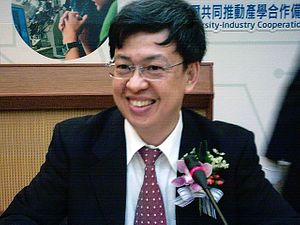The Democratic Progress Party (DPP) chairperson and presidential hopeful Tsai Ing-wen will not make history by becoming the first democratically elected female head of state in East Asia. That title has already been claimed by South Korea’s president Park Geun-hye, who was voted into office in 2013. But Tsai, who has a commanding lead in the polls, is making waves in other areas. Specifically, if she is elected next year, her cabinet appointments could well make the same kinds of headlines seen recently with the diverse cabinet formed by Canadian Prime Minister Justin Trudeau.
Tsai has promised in her campaign that she would transform Taiwan and unite the Taiwanese people. It is her emphasis on openness and reconciliation that has won her widespread support across the island. No one is to feel excluded in the new Taiwan that Tsai envisions. And choosing to team up with Chen Chien-jen as her running mate for Taiwan’s top job would seem to exemplify this pledge.
At first glance, Chen would not exactly seem to embody diversity. If anything, he seems a policy wonk. Chen holds a PhD in epidemiology from John Hopkins University and until recently (he resigned soon after the nomination) was vice-president of the Academia Sinica (Taiwan’s national academy). He is also a professor at the prestigious National Taiwan University. Moreover, Chen served as Minister of Health and Minister of National Science in President Chen Shui-bian’s administration (2000-2008). He was widely praised for his response to the 2003 SARS outbreak.
Even though Chen Chien-jen is mostly known for his scientific expertise, he has not stayed clear of politically sensitive issues. In 2014, he was among the Academia Sinica’s signatories to a joint statement calling for a referendum on the construction of the controversial fourth nuclear power plant. The statement also questioned nuclear power in general as a viable solution for Taiwan due to the island’s location in a seismic zone.
But Chen is not the first scientist expected to assume a high office in Taiwan. Nor are his political views unprecedented. Rather, it is his religious denomination. Chen is a Catholic, one of fewer than 5 percent of Taiwanese who identify as Christian. (More than 90 percent of the population are Buddhist or Taoist.) Chen appears to be quite devoted to his faith, acknowledging that his bishop was among the people he sought counsel from over the decision to join the presidential race. Moreover, he has been named a Knight of the Order of St. Gregory the Great and a Knight of the Holy Sepulcher by the Catholic Church. It is noteworthy that the Holy See is Taiwan’s sole diplomatic ally in Europe.
Tsai Ing-wen has yet to announce her ministerial candidates, but the recently published document containing the names of the DPP’s candidates for legislators at-large is a good indicator about what we might expect.
Of 113 Taiwanese parliamentarians, 34 are elected on an at-large basis, where the ballot is cast for the entire party, not a particular candidate. Of the top 16 DPP candidates, all expected to win election without problem, eight are female. But the “diversity” factor is not determined by gender proportion – that is required by electoral legislation. It is diverse values and expertise that have earned the DPP praise in social media.
The names on the list include:
- The disabled Secretary General of Taiwan’s League for Persons with Disabilities Wang Rong-zhang
- The aboriginal TV personality Kolas Yotaka (six more seats for legislators are already distributed among representatives of Taiwanese indigenous people)
- Yu Wanru – who chairs an eco-friendly business venture
- The DPP lawmaker Yu Mei-nu, an advocate for the rights of women and LGBT citizens who has tabled amendments on marriage equality
- Lin Ching-yi – a gynecologist and women’s rights campaigner
Tsai herself has been promoting marriage equality. Her “Light Up Taiwan” campaign featured metro cards with rainbow circles and marriage equality slogans. The second edition, limited to 18,000 pieces, sold out in 15 minutes. That might not surprise anyone in a Western country anymore, but Taiwan is still rather conservative, where for instance adultery is a criminal offense. (South Korea only decriminalized adultery in February of this year.) Despite the fact that a vast majority of Taiwanese (82 percent according to a poll conducted in 2013) oppose the decriminalization of adultery, Yu Mei-nu proposed relevant amendments.
But how does a devout Catholic vice-president fit into such a progressive team? This question came up during a press conference held by Chen. When asked about his faith’s impact on his views on diversity, Chen replied that God loves every human being, including gays, who have the right to pursue happiness. He added that the potential legalization of same-sex marriage would require a broad debate.
Given the DPP’s impressive lead in public opinion polls, there is little doubt that the new Taiwanese government will have the legitimacy to undertake progressive social reforms. As a side note, just two days after Chen’s nomination, Tsai’s opponents from the ruling KMT and its junior coalition partner People First Party, Eric Chu and James Soong respectively, nominated their own running mates. The fact that both are female may indicate that all the major political forces in Taiwan recognize the breadth of the public’s desire for diversity.
Jakub Piasecki is currently affiliated with the Poland-Asia Research Center. He was previously Press Officer and Policy Advisor on China at the European Parliament, Visiting Fellow at the Taiwan Foundation for Democracy, and Taiwan Fellow at the EU Centre in Taiwan, National Taiwan University (sponsored by the Ministry of Foreign Affairs of the Republic of China, Taiwan). Follow him on Twitter: @piasecki82

































